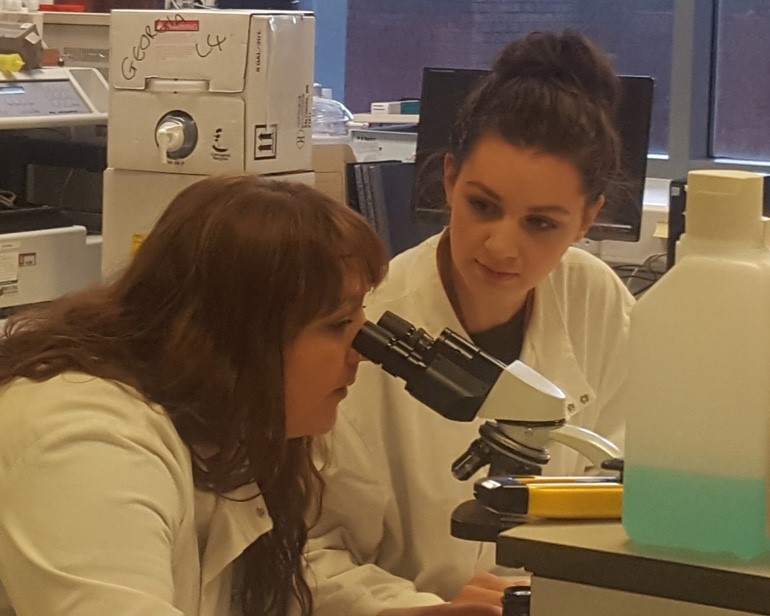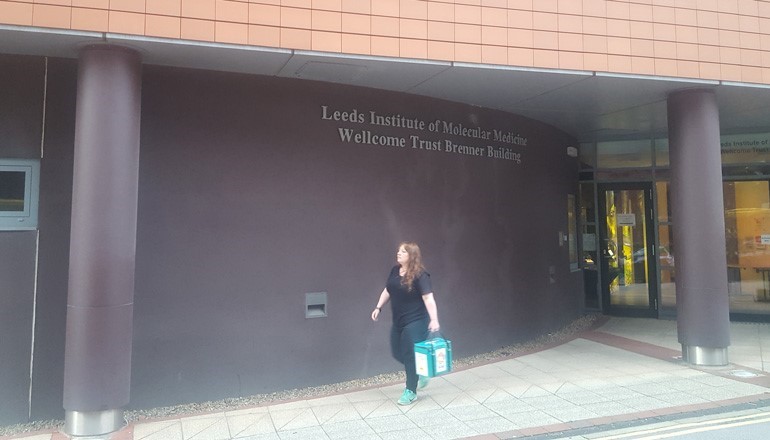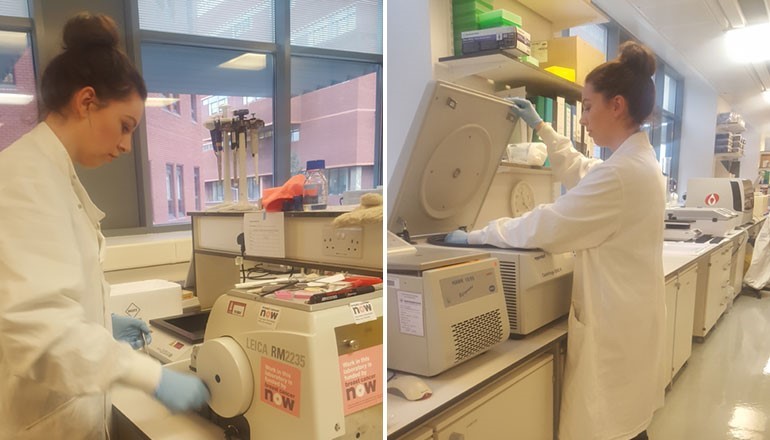The Breast Cancer Now Tissue Bank is the UK’s largest unique collection of high-quality breast tissue, breast cells and blood samples donated by breast cancer patients. Scientists can apply to use these tissue samples in their work, to help them understand more about how breast cancer behaves, grows and spreads.
Angie Berwick is part of the team that gets these tissues ready for scientists to use. She tells us what a typical day is like working in the lab at our bank in Leeds.

Some of the tissue bank team examine samples under a microscope
Monday morning
It’s a Monday morning. I check my emails and see that over the weekend a scientist has requested tissue from the Tissue Bank. I start to digest this just as the phone rings, it’s the Histopathology department at the other side of the Hospital – this team receive tissue samples after patients have undergone surgery, and examine them for disease. A sample has been donated to the Tissue Bank and they would like us to come and collect it.
I look out of the window and wonder if I need a coat? It’s not raining so I decide I will go collect it without one.
As soon as my feet are outside it starts raining.
Fine, I don’t mind rain. Then I see lightning closely followed by thunder, I start to run.
I arrive at Histopathology very wet and very out of breath. I say good morning to the Histopathology staff, one of them asks me if it’s raining out… not such an odd question as they are in a windowless lab, so I act as their weather vane.
I carefully package and label the sample for transportation back to the lab, put in its protective bag and off I go again to do the run across the hospital campus back to the University research facility.

Angie transports the protective bag containing a tissue sample back to the lab
Back in the lab
Back in the lab I complete the paper work for the samples and begin to process them. Some of the sample will be embedded in paraffin wax so that it can be cut into really thin sections to look at using a microscope, and the other part of the sample will be plunged into liquid nitrogen and then stored in an ultra-cold freezer to preserve the tissue. Just as I get my lab coat and lab gloves on the phone rings again. The gloves come off…
The caller is our research nurse, she has been to see some patients this morning. The ladies (and not forgetting the occasional man) have kindly agreed to donate blood and tissue samples to the Tissue Bank. Since the Tissue Bank in Leeds began we have had around 1,700 people agree to donate tissue.
My colleague comes into the lab to take over the processing of the sample I have just collected, I take off my lab coat and set off across campus again.
The weather isn’t as dramatic this time as I go across to meet our research nurse and she tells me that two patients have consented to donate to the bank so far today and that we should expect tissue from them this evening as they are about to go into surgery.

Left: One of Angie's team uses a machine called a microtome to slice the samples; Right: One of Angie's team uses the centrifuge to spin blood samples
Thinking of our patients
As lab staff, we don’t get to meet the patients, except when they are invited to lab tours to find out about the workings of the Tissue Bank. But we do think about every single patient that donates to the Breast Cancer Now Tissue Bank. Nearly all of the lab team have been touched by cancer in some way, so we look after these samples as we would want our own or our loved ones’ samples to be looked after.
We are also very grateful to ASDA for their fundraising efforts, all those marathons ran and heads shaved enable the Tissue Bank to have the staff and resources to provide samples to the research community in the fight against cancer.
I take the blood samples from our research nurse back to the lab and spin them in the centrifuge, a machine that spins the test tubes quickly to separate out the different parts of the blood.
Just as I start printing out labels for the tubes… the phones rings again… and I haven’t forgotten about the tissue request. I’ll deal with that next.